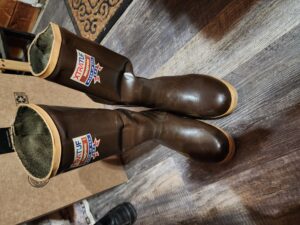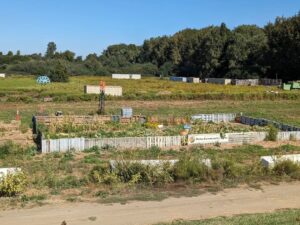 I live in 198 square feet. I do not need more stuff. So I strive to tame my secondhand shopping. I troll for small iron pieces, books, and — until I completely filled the allocated shelves — hand-thrown pottery mugs. I cradle each piece in my hand. Does the handle perfectly fit my clumsy fingers? Will this old iron winch hold the screen door open if I inch it forward with one foot? Does the first paragraph of that paperback entice?
I live in 198 square feet. I do not need more stuff. So I strive to tame my secondhand shopping. I troll for small iron pieces, books, and — until I completely filled the allocated shelves — hand-thrown pottery mugs. I cradle each piece in my hand. Does the handle perfectly fit my clumsy fingers? Will this old iron winch hold the screen door open if I inch it forward with one foot? Does the first paragraph of that paperback entice?
When I spied the tall waders, a little thrill ran through me. I don’t fish. I don’t muck about in stables. But I’ve known enough people who do that I recognized the brand. The heft of them alerted me to their original value, which a quick search on Google confirmed. Each boot had a nick on the curved surface. One of them had been poorly repaired. I imagined a cleaning knife slipping; I pictured an awkward leap to the cluttered deck of a fishing boat.
At three dollars, this sturdy pair had to come home with me. I had no use for them, but I live across from a marina. Though I don’t spend any time in boats, I know lots of folks who do. Most of them treat their vessels like summer toys, but a few live aboard. Surely, I reasoned, I know some serious fisher-folk. And there’s the rainy season. And camping. I live on an island inundated by fierce sheets of water for three weeks each winter. Someone could use these.
In the dim light of my tiny house, I picked at the bubble of glue over one hole until it pulled away, revealing the damage that it had been intended to remedy. I searched for my patch kit. Failing that, I deployed a square of duct tape and Gorilla glue. A day later, my mend had cured and seemed perfect, but by then, I had ordered a new supply of repair squares for five bucks from Amazon.
Once I had executed a perfect mend, I took a photo and showed it to a couple of people with mountain abodes. I figured they might need such fine footwear. The lukewarm responses did not deter me. One evening, I thought about my friend Tim, the Andrus Island pig farmer. I texted a photo to him. I found these at Goodwill for $3, I disclosed. I repaired two small holes and they seem as good as new! Can you all use them down there? “Down there” meant two miles around the Loop, at the Delta Community Farm which spans a dozen acres of our island.
He did not hesitate. I have a boot library for visitors, he told me. These will go great in that! thanks!
A smile crept across my face. I sent a heart emoji back to let him know that I would save my rescued treasure for him. I poured a glass of water and went outside. The evening began to settle around me. I contemplated a library filled with boots of every size and color. Children raced to its shelves, hunting for the perfect galoshes. A tired worker exchanges his worn waders for a shiny black pair. Teenagers vie for vibrant rainboots and leave with linked arms. Patrons nestle on comfy corner couches, crowing over glorious finds.
On the same thrifting adventure, I had found a book by one of my favorite authors. I stood in the aisle reading the first few pages. If I had previously enjoyed this volume, I could not remember the plot. At ninety-nine cents, the risk seemed small. I set the book in my cart beside the tall green boots, and moved toward the cashier. I tried not to seem smug, but that’s certainly how I felt.
It’s the eighth day of the one-hundred and seventeenth month of My Year Without Complaining. Life continues.
From Tim Anderson’s Facebook page: “The farm is a giant hydroponic system. there’s a giant sponge of tule peat underneath it that gets constantly soaked from the water pressure of the river being higher than the land. years of farmers have moved dirt into the wet spots so it’s not flat but it’s fairly uniformly damp except for the roads. compare this to the brown hills that have been dead and dry for months. they got the same rains we did, this was a wet year which means it rained maybe four times since spring mostly just sprinkles.
“The community garden got some hand watering but once the plants put their roots down they took care of themselves. had we started it earlier they wouldn’t have needed any watering.”
